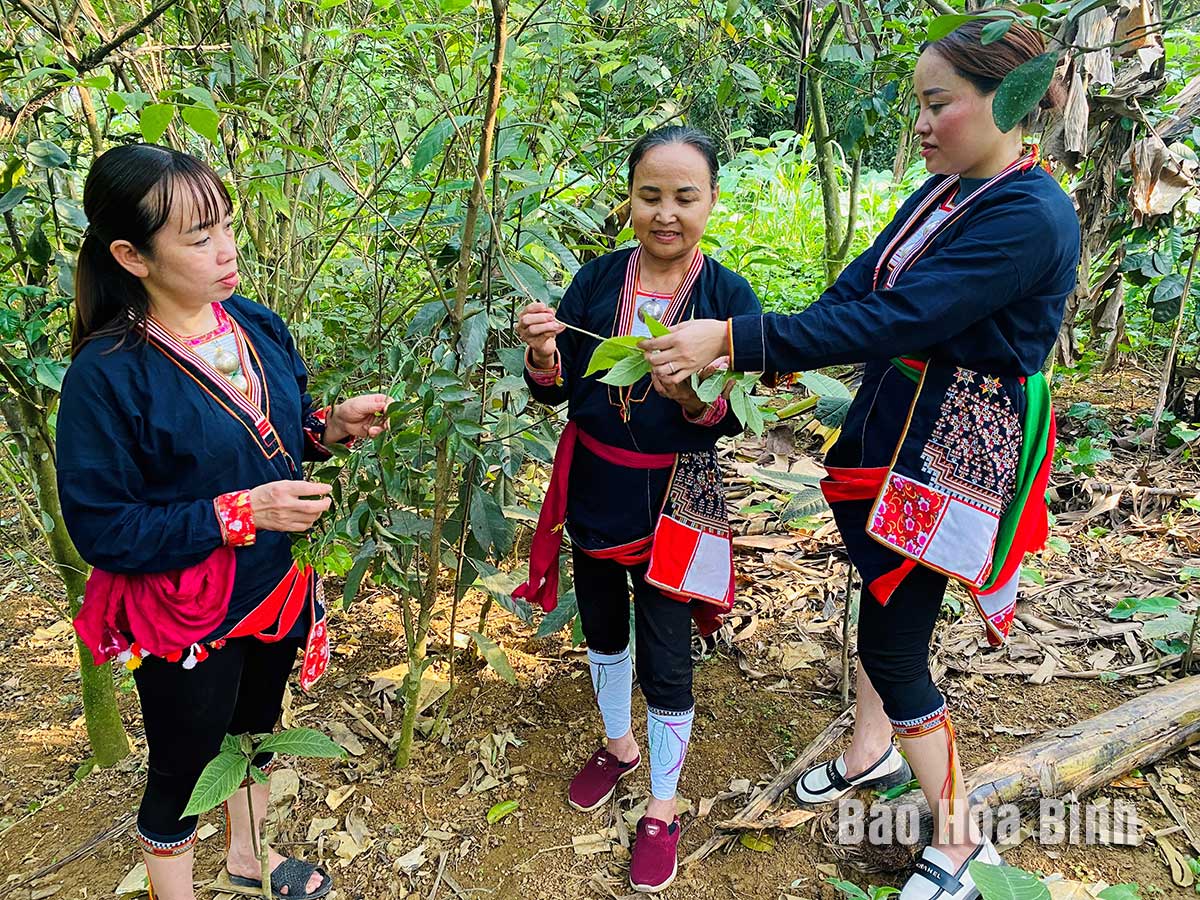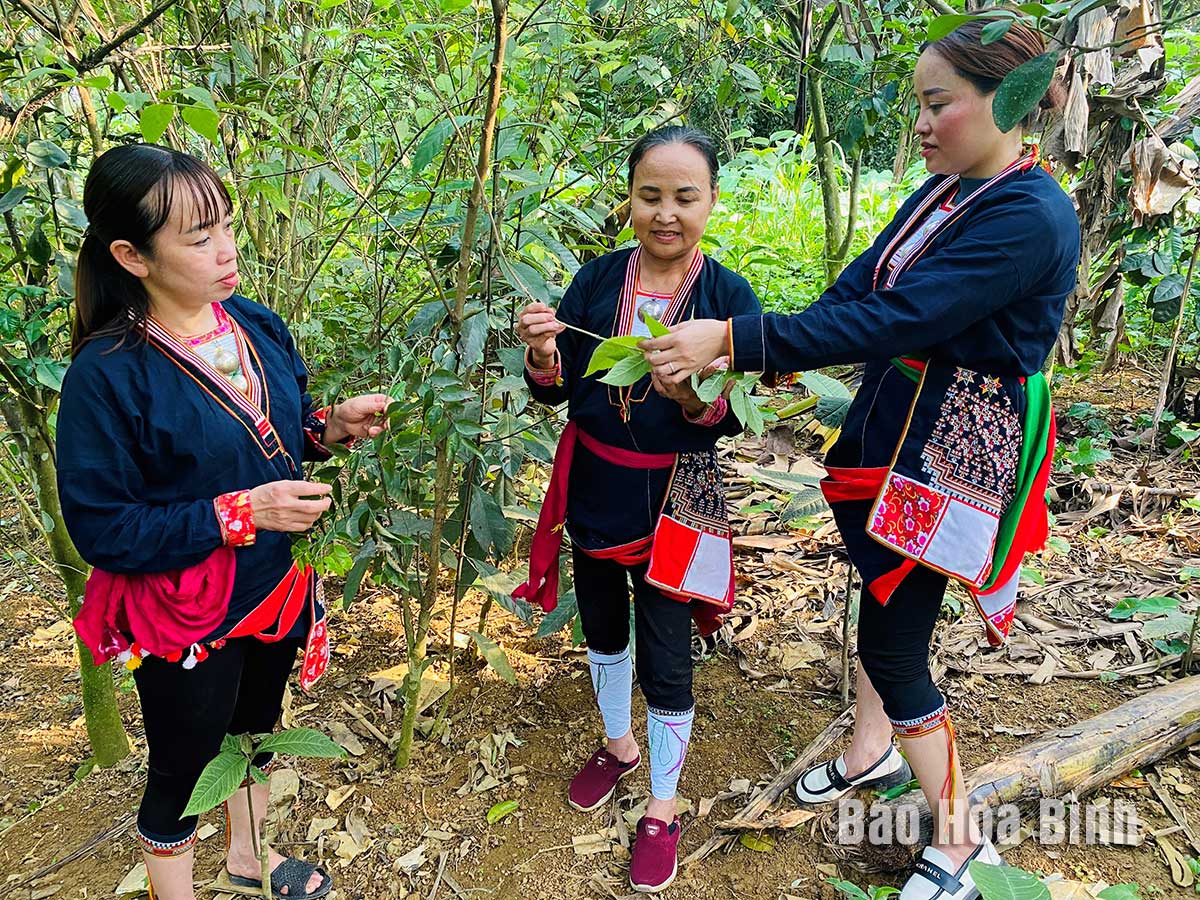
With rich knowledge of medicinal materials in nature, Dao ethnic minority people in Tu Son commune of Kim Boi district have practiced traditional medicine for generations and brought their long-standing therapies into play in the current life.
Phung Thi Hien (first, right), a resident in Thung Dao
Bac hamlet of Tu Son commune (Kim Boi district), introduces precious medicinal
plants of the Dao ethnic minority group.
Phung Thi Hien was born to a family having four
generations practicing traditional medicine in Thung Dao Bac hamlet of Tu Son
commune. After graduating from high school, she enrolled on the Tue Tinh
traditional medicine school with the hope of preserving traditional remedies
and adding new knowledge to her ethnic group’s remedies.
After nearly 20 years of working and gaining
experience, now she has wide knowledge of over 120 medicinal materials and a
number of remedies for bone, joint, stomach, liver, and kidney illnesses, among
others.
Hien said she had learnt those remedies from her
mother. Each remedy contains tens or even hundreds of herbal ingredients.
Patience, prudence, and wholeheartedness are needed to practice traditional
medicine. Sometimes, it takes even months in forest to seek enough ingredients
for a remedy.
To develop medicinal plants for use in the Dao
people’s traditional remedies and also create jobs and improve the life quality
in Thung Dao Bac, Hien established Phung Gia (Phung Family) traditional
medicine cooperative with seven members in 2019. Since the cooperative’s
inception, local residents have replaced traditional crops with medicinal
plants as natural resources are limited and they also want to preserve the
precious genetic sources in the face of overexploitation.
The cooperative sold its products mainly in the
northern region, especially Hanoi, Hung Yen, and Vinh Phuc, earning more than 3
billion VND (119,500 USD) in total revenue in 2023.
To scale up production, in April 2024, the Phung
Gia traditional medicine cooperative was dissolved to establish the Thien Nam
Green Herbs Co. Ltd., based in Ve hamlet of Dong Bac commune, Kim Boi district.
The company is applying high technology to improve product quality, promoting
activities under production chain, and aligning medicinal plant cultivation
with market demand, thus working towards the sustainable development of traditional
medicine.
Bui Van Lam, Vice Chairman of the People’s
Committee of Tu Son commune, said to preserve the traditional medicine of the
Dao people and build a brand, the local Party Committee and administration will
conduct a survey of medicinal plants in forest and step up communications to
encourage local residents to join hands in preserving and developing the
valuable plants.
Aside from curing illnesses, traditional
medicine also helps the Dao people improve their income and quality of life.
However, authorities and the community still need to give more attention and
support so as to sustainably develop medicinal plants and generate better
economic benefits for local residents, he added.
With an increasingly vibrant and widespread emulation movement aimed at building cultured residential areas and cultured families, Yen Thuy District has been making steady progress toward improving both the material and spiritual well-being of its people, while fostering a civilized, prosperous, beautiful, and progressive community.
Once lacking recreational spaces and community facilities, Residential Group 2 in Quynh Lam Ward (Hoa Binh City) has recently received attention for the construction of a new, spacious, and fully equipped cultural house. The project followed the model of state support combined with public contributions in both labor and funding.
The "All people unite to build cultural life" movement, which has been effectively integrated with Kim Boi district’s socio-economic development goals, is fostering a lively spirit of emulation across local residential areas, hamlets, villages, public agencies, and enterprises. In addition, through the initiative, traditional cultural values are being preserved and promoted, while community solidarity and mutual support in poverty reduction and economic development are being strengthened.
A working delegation of the Hoa Binh provincial People’s Committee led by its Permanent Vice Chairman Nguyen Van Toan on June 11 inspected the progress of a project to build the Mo Muong Cultural Heritage Conservation Space linked to tourism services in Hop Phong commune, Cao Phong district.
Born and growing in the heroic land of Muong Dong, Dinh Thi Kieu Dung, a resident in Bo town of Kim Boi district, in her childhood was nurtured by the sweet lullabies of her grandmother and mother. These melodies deeply imprinted on her soul, becoming an inseparable part of her love for her ethnic group's culture. For over 20 years, this love for her hometown has driven Dung to research, collect, and pass down the cultural values of the Muong people to future generations.
In the final days of May, the Ethnic Art Troupe of Hoa Binh Province organized performances to serve the people in remote, mountainous, and particularly disadvantaged areas within the province. These were not just ordinary artistic shows, but they were the meaningful journeys aimed at spreading cultural values, enhancing the spiritual life of the people and contributing to the preservation of ethnic minority cultural identities.



